Key takeaways:
- Moral relativism highlights how moral beliefs vary across cultures and are influenced by individual experiences, prompting deeper empathy and understanding in discussions about ethics.
- Religious education fosters critical thinking about morality, encouraging engagement with diverse perspectives and challenging preconceived notions about right and wrong.
- Understanding moral relativism involves navigating emotional complexities and respecting differing beliefs, which can lead to rich dialogue and collaborative approaches to moral dilemmas.
- Practical applications of moral relativism include active listening, embracing cultural differences, and fostering open conversations, which can enhance personal and communal relationships.
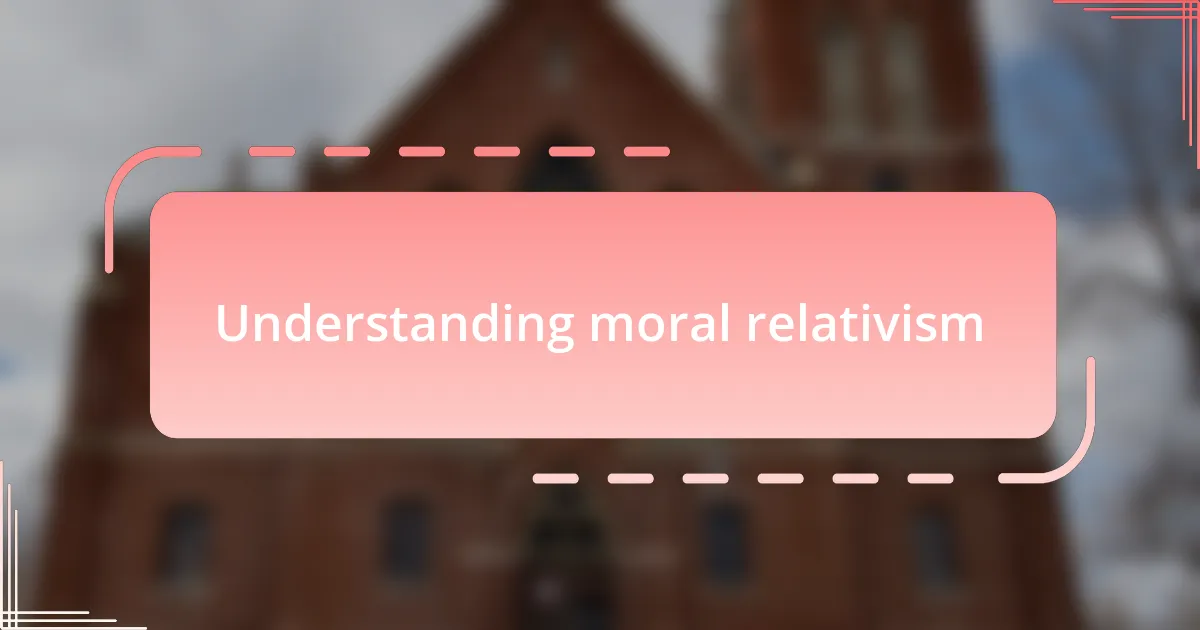
Understanding moral relativism
Moral relativism is the concept that what is considered morally right or wrong can vary significantly across different cultures and societies. I still remember the moment I engaged in a heated discussion with a friend about the ethics of honesty. For him, telling a white lie to spare someone’s feelings was perfectly acceptable, while I saw it as a breach of trust. It made me question: is there a universal moral truth, or are our ethical beliefs shaped solely by our backgrounds?
Reflecting on my travels, I witnessed diverse practices that challenged my own moral framework. In one country, communal living and kinship bonds took precedence over individual rights, making me reconsider my own views on what constitutes justice and fairness. This experience left me pondering how deeply our morals are intertwined with our surroundings, raising the question: if morality is fluid, how can we navigate our interactions in this global society?
I’ve often found that understanding moral relativism opens up a deeper dialogue about empathy and respect for differing beliefs. When I approach conversations with an open mind, I feel a sense of liberation; it allows me to appreciate the complexities of human experience. This perspective has enriched my relationships, prompting me to ask not just, “What is right?” but also, “Why do we see things so differently?”
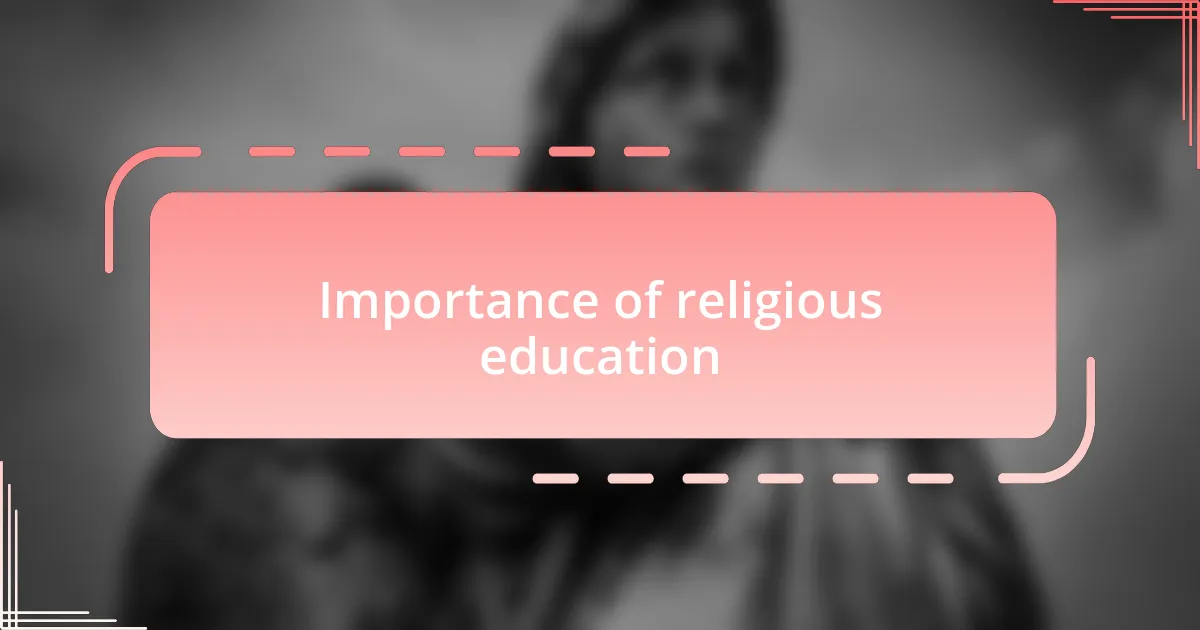
Importance of religious education
Religious education plays a pivotal role in shaping our moral compass and understanding of right and wrong. I vividly recall my own experience in a religious studies class, where discussions about compassion and justice invited me to explore ethical dilemmas in a supportive environment. It was fascinating to see how these lessons extended beyond the classroom, influencing my interactions in everyday life.
Moreover, religious education fosters critical thinking by encouraging students to engage with diverse philosophies and beliefs. During one project, I researched how different religions define integrity. This exploration not only expanded my understanding but also made me question my preconceived notions. How often do we allow our backgrounds to color our views of ethical behavior?
In essence, religious education provides a framework through which we can understand and appreciate the complexities of morality. I find that reflecting on these teachings often leads me back to my own decisions and values. Are we truly ready to consider the moral perspectives of others, or do we clench tightly to our own beliefs? It’s a challenge worth confronting.
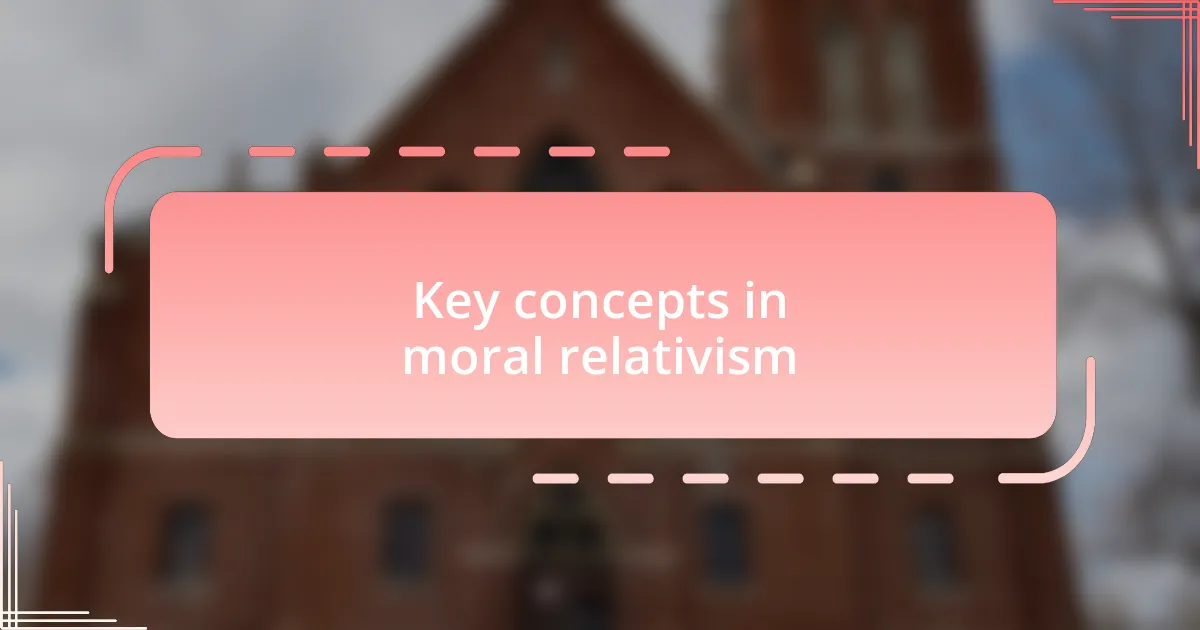
Key concepts in moral relativism
When I first encountered moral relativism, it became clear to me that one of its key concepts is the idea that moral judgments are shaped by cultural, societal, and personal contexts. This realization struck me during a discussion with a friend from a vastly different cultural background, where something I considered morally acceptable was completely off the table for them. It made me wonder—how often do we assume our moral beliefs are universally applicable?
Another essential aspect of moral relativism is the acknowledgment that no single moral framework holds absolute authority over others. I remember grappling with this when teaching a unit on ethical diversity. The students and I often debated whether actions deemed wrong in one culture could be seen as right in another. This dialogue illuminated how deeply ingrained our values can be and how essential it is to approach moral discussions with an open mind.
Lastly, the concept of moral relativism emphasizes that moral truths are not static but can evolve over time and through experiences. Reflecting on my own journey, I’ve noticed how my views have shifted in response to new information and encounters. This leads me to ask: how flexible are we in adapting our moral frameworks as we learn from each other?
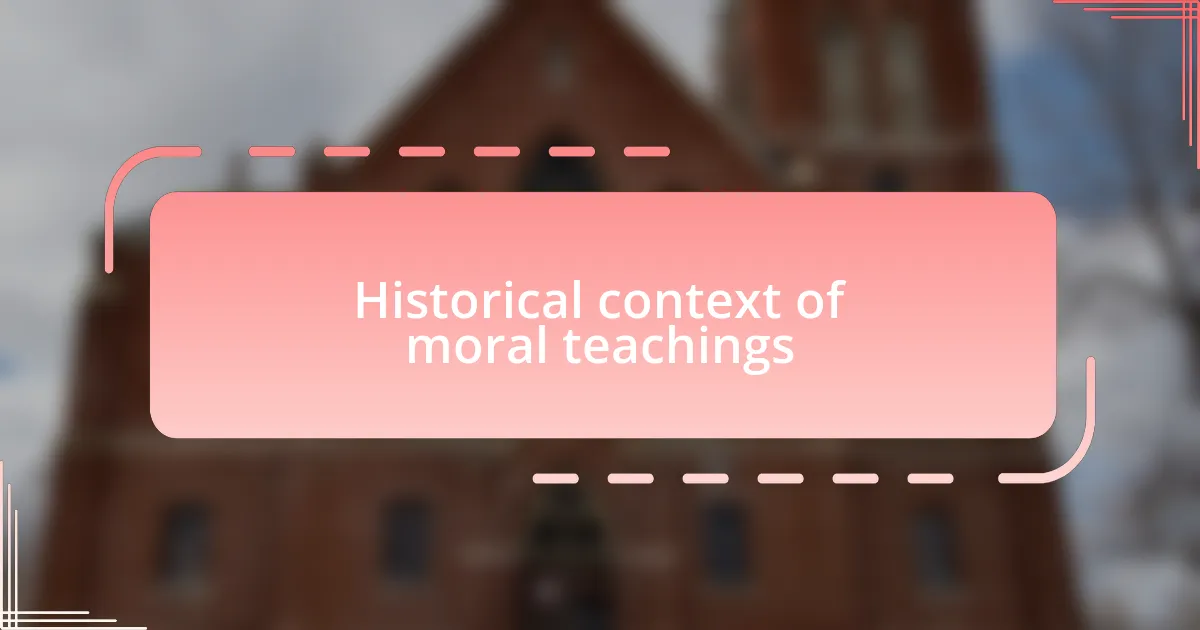
Historical context of moral teachings
Throughout history, moral teachings have evolved alongside cultural and societal changes, reflecting the complexities of human experience. For instance, ancient cultures often based their moral frameworks on religious beliefs, with divine commandments guiding what was deemed right or wrong. I recall a lecture on ancient Greek philosophy where we learned how thinkers like Aristotle began questioning these rigid structures, leading us to consider—can we be moral without divine instruction?
The Enlightenment marked a pivotal shift in moral thought, introducing ideas centered around reason and individual rights. I remember reading about Kant, who emphasized duty and universal moral laws. This made me reflect on how these ideas resonate today—do we still use reason as our moral compass in an age dominated by subjective perspectives?
More recently, moral teachings have increasingly focused on human rights and social justice, highlighting the importance of context in moral decision-making. I vividly recall participating in a community dialogue about social equity, where diverse perspectives sparked my understanding of how history shapes current moral viewpoints. This leads me to wonder: how do the legacies of past moral teachings continue to influence our understanding of right and wrong today?
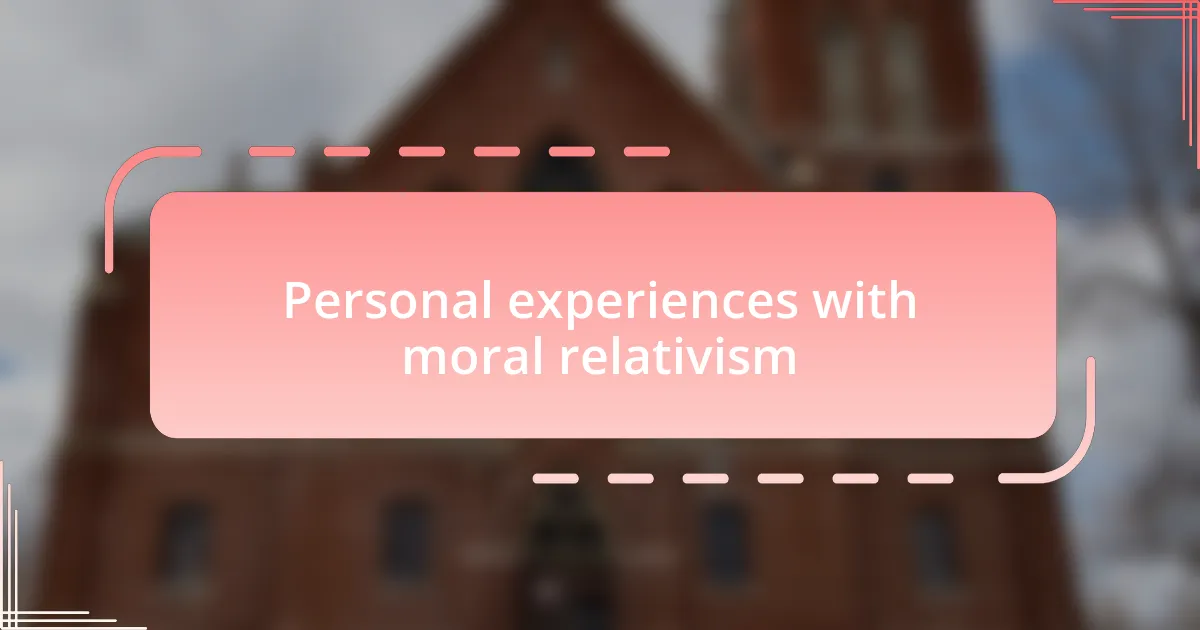
Personal experiences with moral relativism
During my time volunteering in a multicultural community, I was frequently confronted with differing moral perspectives on issues like marriage and family. One day, I heard a colleague speak passionately about arranged marriages, rooted deeply in her cultural background. It struck me then—how could something viewed negatively in my culture be embraced so wholeheartedly in hers? This encounter opened my eyes to how personal experiences shape our moral compass.
I also remember a heated debate in my philosophy class about capital punishment. I took a strong stance against it, rooted in my belief that every life has value. However, when one of my classmates shared their story of a loved one affected by violent crime, I felt a surge of empathy. It made me ponder—how could I remain rigid in my views when the emotions attached to moral decisions can vary so dramatically based on individual experience?
Reflecting on these experiences, I’ve come to realize that understanding moral relativism isn’t just about acknowledging differences—it’s about engaging with them emotionally and intellectually. I often ask myself: what if we approached moral discussions not just with our principles, but with the stories of those who live them? This shift in perspective has transformed my approach to morality, encouraging me to embrace dialogue over debate.
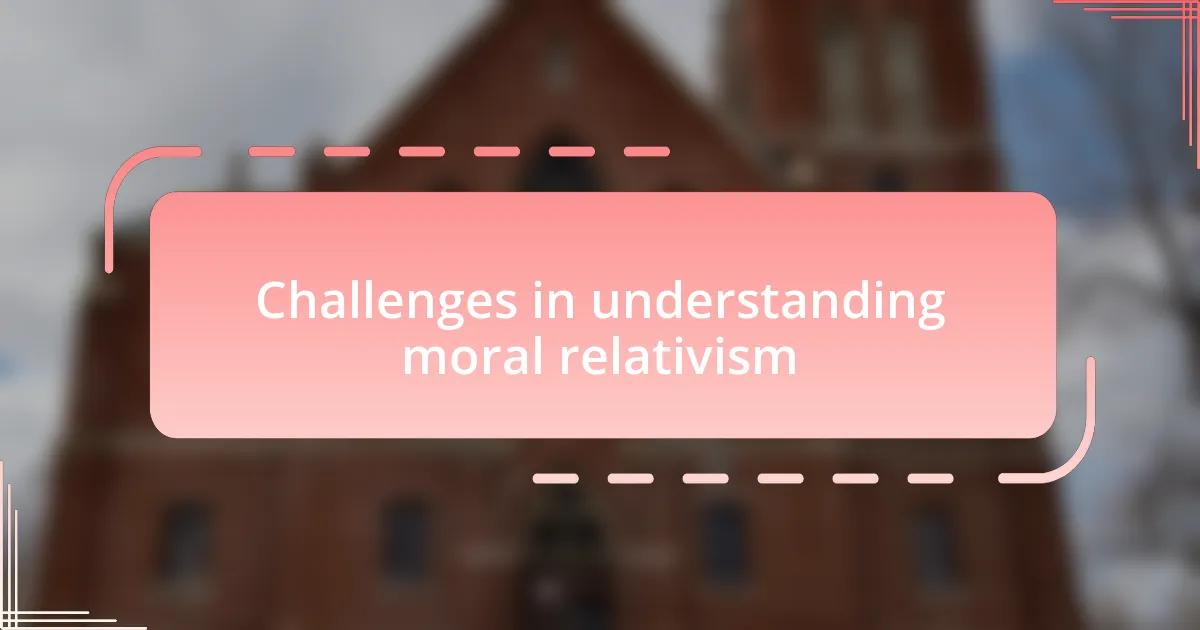
Challenges in understanding moral relativism
Understanding moral relativism can feel like traversing a complex maze with no clear exit. I recall a workshop I attended focused on ethical decision-making. During a discussion about cultural practices, a participant shared her struggles with honoring family traditions while also desiring personal freedom. Listening to her, I questioned: how do we balance respect for cultural norms with our own moral beliefs? This duality often leads to confusion and frustration for many of us trying to navigate our values in a diverse world.
Another challenge arises from the emotional weight these discussions carry. I remember discussing animal rights with a friend who grew up in a farming community. Her attachment to the land and the animals was palpable, and my views on animal welfare felt distant from her reality. It made me realize how emotional connections can complicate moral reasoning. Can we truly engage with relativism if our feelings clash with someone else’s lived experiences? I found that finding common ground, even if it’s elusive, requires patience and understanding.
Sometimes, the very term “moral relativism” can provoke defensive reactions. I once mentioned it in a conversation at a community event, and the immediate backlash surprised me. People seemed to perceive it as a threat to their values. As I reflected on that moment, I asked myself: why do certain concepts evoke such strong reactions? I believe it’s because they challenge our deeply held beliefs, making it crucial for us to approach these discussions with empathy and without judgment.
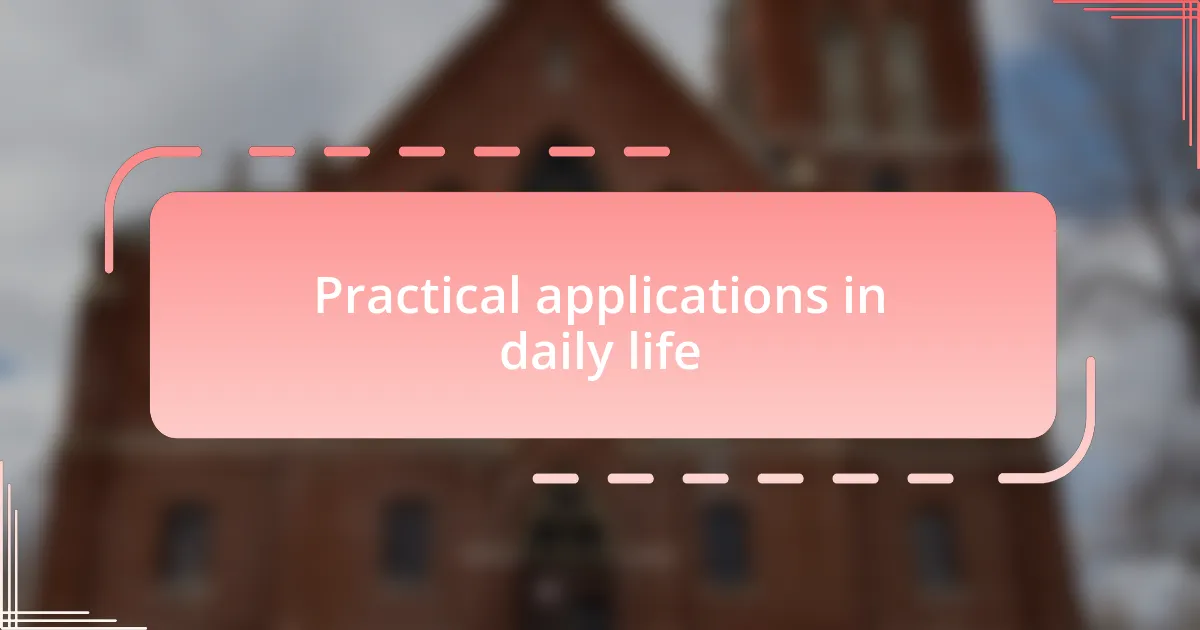
Practical applications in daily life
Practicing moral relativism in daily life often starts with simple yet profound actions, such as listening. I recall a time when I volunteered at a multicultural center. Each week, I was able to sit down with individuals from various backgrounds and hear their stories. It struck me how much understanding I gained just by being open to perspectives different from my own. Wouldn’t the world be better if we all took a moment to truly listen?
In my own family, moral relativism manifested when we celebrated holidays. I witnessed my relatives blending their traditions with those of friends and neighbors, creating a richer, more inclusive experience. This fusion highlighted for me the beauty of respecting and embracing differences. How often do we overlook the importance of adaptability in our values? Adapting allows for shared experiences and fosters connections that transcend cultural divides.
Navigating moral relativism also plays a role in how we engage in discussions online. I remember a heated exchange over social media regarding a controversial topic. Instead of reacting defensively, I chose to ask questions that encouraged others to share their viewpoints. I found that this approach not only diffused tension but also enriched my understanding. Isn’t it fascinating how dialogue can open doors, transforming conflicts into opportunities for growth?